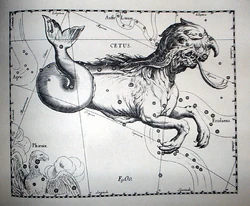
17th century illustration of the constellation Cetus by Johannes Hevelius.
In ancient Greek, the word ketos (Greek: Κῆτος, Kētos, plural cetea κήτεα - Latinized as cetus) - denotes a large fish, a whale, or a sea monster.[1] The sea monsters slain by Perseus and Heracles were each referred to as a cetus by ancient sources.[2] The term cetacean originates from cetus. In Greek art, cetea were depicted as serpentine fish. The name of the mythological figure Ceto is derived from ketos. The name of the constellation Cetus also derives from this word.
Mythology[]
When Cassiopeia boasted that her daughter Andromeda was more beautiful than the Nereids, this invoked the wrath of Poseidon who sent the sea monster Cetus to attack Æthiopia. Upon consulting a wise oracle, Cepheus and Cassiopeia were told to sacrifice Andromeda to Cetus. They had Andromeda chained to a rock near the ocean so that Cetus could devour her. Perseus found Andromeda chained to the rock and learned of her plight. When Cetus emerged from the ocean to devour Andromeda, Perseus managed to slay it. In one version, Perseus drove his sword into Cetus' back. In another version, Perseus used Medusa's head to turn Cetus to stone.
In the Bible[]
In Jonah 2:1 (1:17 in English translation), the Hebrew text reads dag gadol (דג גדול), which literally means "great fish." The Septuagint translates this phrase into Greek as mega ketos (μέγα κῆτος). The term ketos alone means "huge fish," and in Greek mythology the term was closely associated with sea monsters. Jerome later translated this phrase as piscis grandis in his Latin Vulgate. However, he translated the Greek word kētos as cetus in Matthew 12:40.
Ships and sailing[]
Cetus has often been used as the name or maiden-head of a ship, depicting either a fearless ship that does not fear the sea, or a ruthless pirate ship that you should be wary of. Cetus and it's other translations, can also be viewed as a misfortune or bad omen by sailors. Sailors, however superstious, believe in a Cetus as the bringer of a great storm, or bad luck on board ship, i.e. lost cargo, pirates or even being put of course due to a storm or flux currents, and will go at lengths to avoid any talk of it on board or on a voyage. Many sailors also fear the Kraken and other sea-monsters, believed from mythology to be related to Cetus.
Notes[]
External links[]
| This Creative Commons Licensed page uses content from Wikipedia (view authors). The text of Wikipedia is available under the license Attribution-Share Alike 3.0 Unported (ToU). |